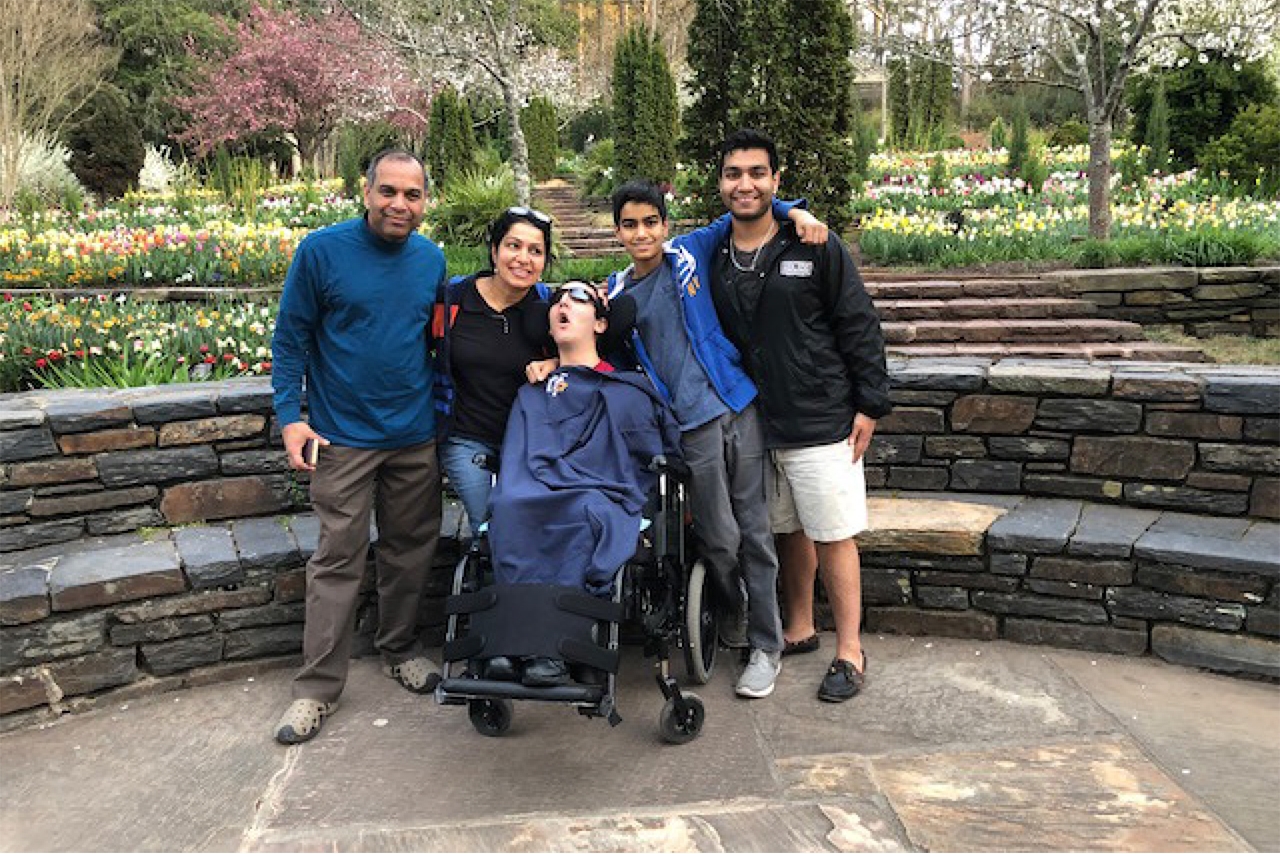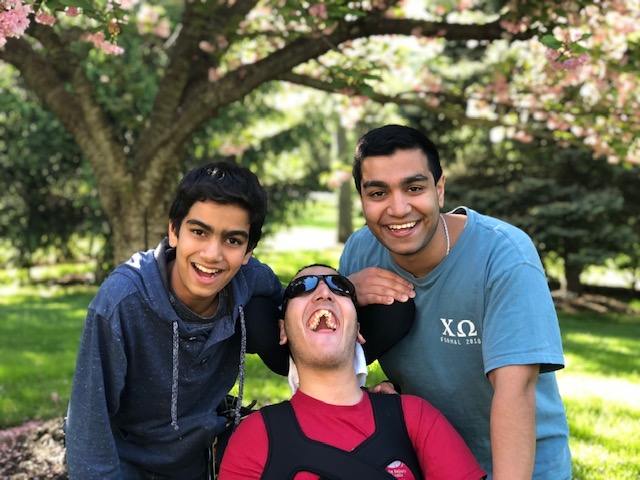New US Brain Injury Alliance Member Jaya George Is a Tireless Advocate for Brain Injury Research
By Ed Roth
The United States Brain Injury Alliance (USBIA) strives to prevent injuries and improve lives through brain injury research and public policy involvement at the state and federal levels to encourage legislation that supports the needs of survivors and their families. The Brain Injury Alliance of Arizona is a chartered affiliate of the USBIA.
“In many ways, all of this has been very positive for us. We all realize what’s important in life,” says Jaya.
“My number one message is that there is hope and no matter what, we must go forward.”
New US Brain Injury Alliance Member Jaya George Is a Tireless Advocate for Brain Injury Research
By Ed Roth
The United States Brain Injury Alliance (USBIA) strives to prevent injuries and improve lives through brain injury research and public policy involvement at the state and federal levels to encourage legislation that supports the needs of survivors and their families. The Brain Injury Alliance of Arizona is a chartered affiliate of the USBIA.
“In many ways, all of this has been very positive for us. We all realize what’s important in life,” says Jaya.
“My number one message is that there is hope and no matter what, we must go forward.”
Growing up on the southern tip of hot and humid India, Jaya George’s life ambition wasn’t to be an advocate for those with disabilities. But like others whose lives have been affected by brain injury, her life and mission changed in an instant.
After receiving her master’s in chemistry from Mahatma Gandhi University, she and husband, Dr. George Avirappattu, moved to the United States. She earned another master’s in chemistry from Miami University (Ohio), before finding work in New Jersey as a scientist.
Along with their three sons – Davis, Jacob, and Daniel – they were enjoying a healthy and happy family life when the universe threw them a curveball.
On October 24, 2008, 7-year-old Jacob was on a Halloween hayride at his church. It was dark, which only added to the spirit of the season. Suddenly, the tractor jolted, and he fell off the tractor.
Jacob was rushed to the hospital where he was diagnosed with a traumatic brain injury (TBI). In the blink of an eye, the brain stem injury he sustained had turned him into a paraplegic, unable to talk and needing 24/7 support. Despite his ability to smile, he could not communicate.
“We ran around like crazy,” recalls Jaya. “We really didn’t know what to do.” Seeking personal relief, she announced she would be quitting her job to devote her efforts to her young son. However, her employer encouraged her to take some time off instead, assuring her that she could always return.
Life changed for Davis and Daniel as well. At 12 and 4, respectively, they embarked on a journey that would involve caring for their brother as well as developing into caring young men. Jaya and her husband have been open with them, but they still fear what else could happen. “I don’t want any more bad things happening to my family,” Jaya admits.
That kind of loyalty and protectiveness can be seen in Davis’ choice to help replicate Jacob’s routine. “In high school, he followed exactly what Jacob did on a daily basis to see how it feels,” relates Jaya. “You don’t see many kids with that level of compassion and desire to look at life through someone else’s eyes.” This led to a touching speech, “In Jacob’s Shoes,” which has been shared many times online.
Daniel has also written about caring for his brother. His 3-part series, “A Brother’s Perspective” has already been published. “You know, since he was 4, this is how life has been for him,” Jaya shares. “No vacations or going to restaurants as a family. Still, we try to accommodate the best we can.”
Overnight, they all became aware of a community they never knew about before. “When the accident occurred, we were all thrown into a new world. We had an extremely good support system with the church, family, friends, and organizations such as the Brain Injury Alliance of New Jersey. It was like a big rock we could all hold on to.”
Even after 12 years, this integration into the brain injury community has manifested in simple but meaningful ways – people still visit Jacob, friends come to read to him, and his piano teacher plays music for him.
Nonetheless, it’s disheartening that Jacob’s ability to communicate hasn’t improved much. Jaya has concluded, “I understand the brain is very complicated. It’s obvious we need more research. This community has opened my eyes to this fact.”
For the past two years, Jaya has worked closely as a family resource specialist for a non-profit organization that supports those who need help. Now she wants to do even more.
“After so many years, research is still in its infancy,” she acknowledges. “We have a long way to go. As part of the USBIA, I hope to help more people whose lives have been touched by brain injury to move ahead.”
Now the newest member of the United States Brain Injury Alliance Governance Committee, Jaya is dedicating her time and energy to promote research and let people know there is hope.
“We’re very fortunate to have someone like Jaya involved,” says Carrie Collins-Fadell, CEO of the Brain Injury Alliance of Arizona. “Not only is she a tireless advocate for more research, but she has also experienced the ups and downs, giving her a perspective that’s invaluable to survivors of brain injury, their families, caregivers, and other professionals.”
“In many ways, all of this has been very positive for us. We all realize what’s important in life,” says Jaya.
“My number one message is that there is hope and no matter what, we must go forward.”
ABOUT BRAIN INJURY ALLIANCE OF ARIZONA
The Brain Injury Alliance of Arizona (BIAAZ) is the only statewide nonprofit organization dedicated to improving the lives of adults and children with all types of brain injuries through prevention, advocacy, awareness and education. BIAAZ also houses the Arizona Brain Health Resource Center, a collection of educational information and neuro-specific resources for brain injury survivors, caregivers, family members and professionals.
What began in 1983 as a grassroots effort has grown into a strong statewide presence, providing valuable life-long resources and community support for individuals with all types of brain trauma at no charge.
The Brain Injury Alliance of Arizona:
- Works with Congressional Brain Injury Task Force
- Houses Arizona Brain Health Resource Center
- Hosts Statewide Opioid Use Disorder & Cognitive Impairment Workgroup
- Has Statewide Opioid Use Disorder & Cognitive Impairment Response team with peer support, training, and family wraparound services
- Facilitates Brain Health Advisory Council
- Manages statewide Neuro Info-Line: 888-500-9165








